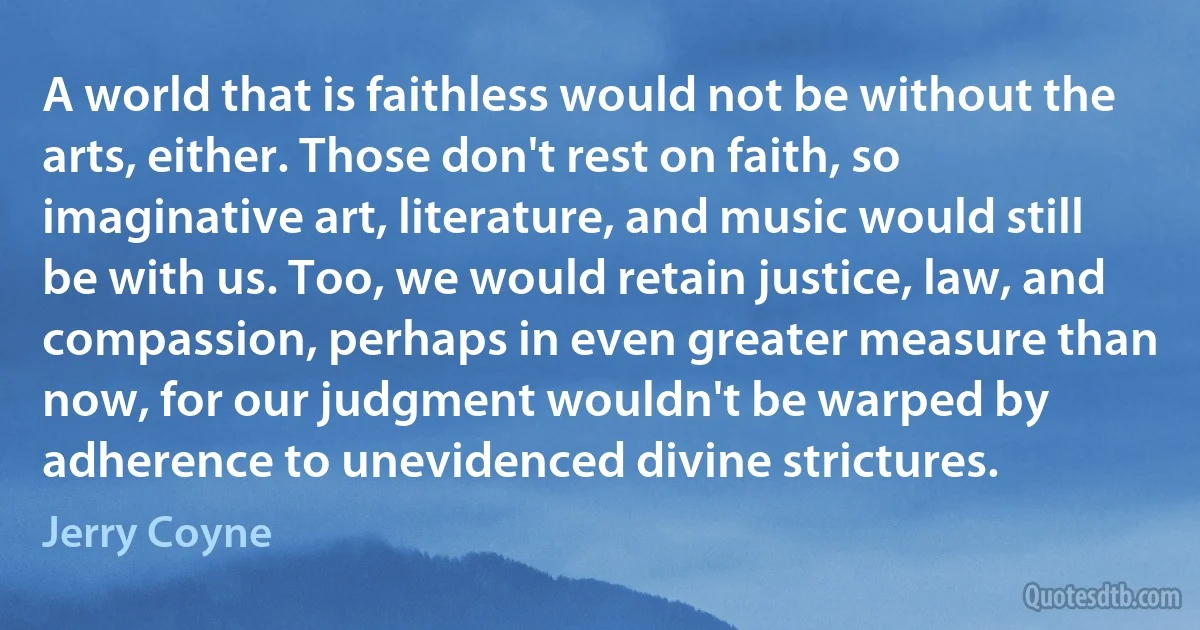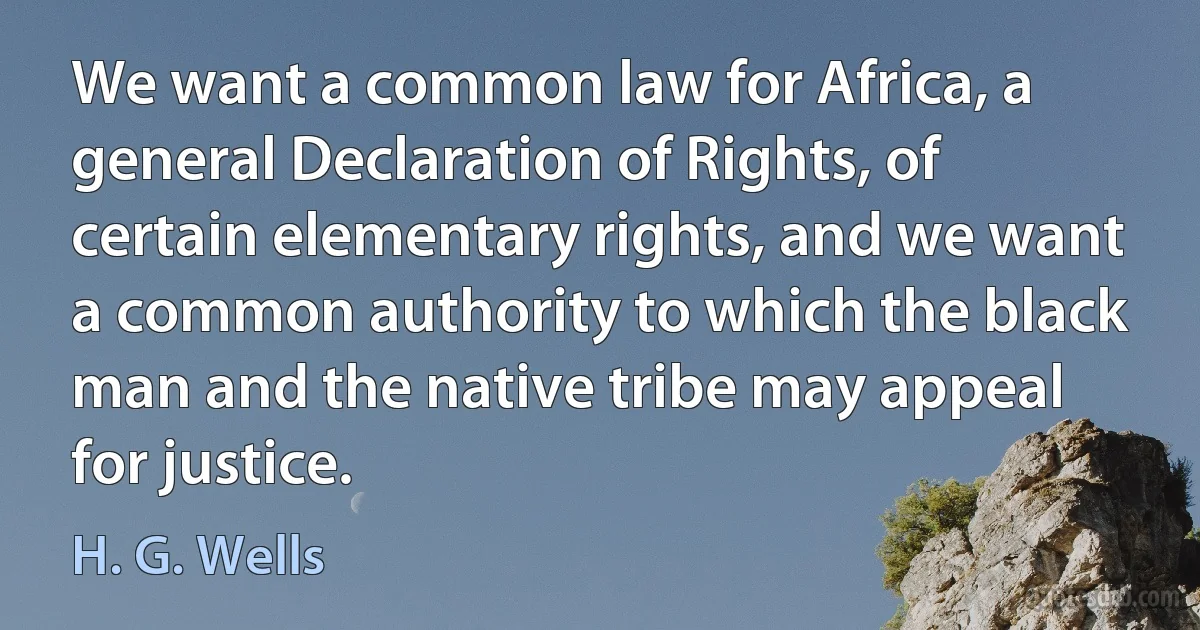Law Quotes - page 89
Of course, atheism, which is merely the lack of belief in gods, isn't responsible for explaining altruism and ethics, a task that properly belongs to philosophy, science, and psychology. And those areas have offered plenty of nonreligious explanations for the "Moral law” and altruism. The explanations involve evolution, reason, and education.

Jerry Coyne
If there be any fact in our history beyond dispute it is that Roger Sherman expressed the universal sentiment of our fathers when he said, 'The abolition of slavery seemed to be going on in the United States, and the good sense of the several States would probably by degrees complete it'. In that spirit the compromises of the Constitution were made. Had not slavery at that time deprecated itself as an evil, the Constitution could not have been formed. Could the future have been foreseen, it would not have been formed. But, reasoning from the light they had, it was fair to believe as they believed, that, when the slave-trade was prohibited, the system would wither away under the double curse of Morality and Law.

George William Curtis
In like manner the Reverend Dr. William A. Smith, President of the Randolph-Macon College in Virginia, in his work upon the Philosophy and Practice of Slavery, deliberately repudiates Mr. Jefferson's view of slavery as a 'grossly offensive error', and attributes the anti-slavery movement to him – which is as wise as to attribute the motion of the earth to Galileo. Judge Wayne, in his late charge at Savannah upon the law against the slave-trade, confirms Mr. Stephens's statement. And, as if to establish it by the most unexpected testimony, Mr. Edward Everett, in his late discourse upon Daniel Webster, said, 'In common with all, or nearly all, the statesmen of the last generation, he believed that free labor would ultimately prevail throughout the continent'.

George William Curtis
This, then, is the gain of the Good Fight in this war, first, that the nation has attained a living consciousness of its inevitable unity, second, that it has proved its enormous power, and third, that in the terrible struggle it has used that united power for, and not against, equal rights. And the spirit of caste which it has disabled it will now utterly destroy. For the Good Fight is not a crusade against a section or a State, but against caste everywhere in the country. This is now entrenched in the bitter prejudice against the colored race, which is as inhuman and unmanly as the old hatred and contempt of Christendom for the Jews. Lifting their heads from bloody defeat in the field, the wan and wasted States of the South say in terms caste must be maintained, and by every kind of vagrant law and hostile legislation they will try to maintain it.

George William Curtis
Therefore our Constitution will always be the measure of our national morality; and if we were all sorry, it would still be true. I am not sorry, for it founds the government in the character of the people, and hence everything in the future depends upon the popular faith in the original principles of the government. If the people of this country do believe with the fathers that there are self-evident, original, and indefeasible human rights, then slavery will surely, quietly, and legally be terminated, under the Constitution of the United States. If they do not believe that there are such rights, then slavery will, just as surely, quietly, and legally, be established under the Constitution, which, as the paramount law of the land, will legalize it in New York as well as in Alabama, leaving the policy of adopting it to be decided by individual judgment.

George William Curtis
Mr. Douglas incessantly remembers to inform us in every speech he has made for a year past that, when the Constitution was formed, all the thirteen States but one recognized slavery by law; but he incessantly forgets to add that Pennsylvania in 1780 passed an act for the gradual abolition of slavery which freed everybody born in the State after its passage; that one day later Massachusetts decided that her Bill of Rights abolished slavery forever; that in 1784 Connecticut followed Pennsylvania, and Rhode Island at about the same time; that in 1792, soon after the Constitution was formed. New Hampshire, under her Bill of Rights, Vermont, by express assertion in her Constitution, New York in March, 1799, and New Jersey in 1804, gradually abolished slavery.

George William Curtis
I had to act with the utmost circumspection to save myself from the suspicion of insanity. My memory of the Law, of the two dead sailors, of the ambuscades of the darkness, of the body in the canebrake, haunted me; and, unnatural as it seems, with my return to mankind came, instead of that confidence and sympathy I had expected, a strange enhancement of the uncertainty and dread I had experienced during my stay upon the island. No one would believe me; I was almost as queer to men as I had been to the Beast People. I may have caught something of the natural wildness of my companions. They say that terror is a disease, and anyhow I can witness that for several years now a restless fear has dwelt in my mind, such a restless fear as a half-tamed lion cub may feel.

H. G. Wells
I do not deny that force has to be used, but I think the forms of the struggle should fit as closely as possible to the opportunities presented by the existing laws, which must be defended against reactionary attacks. There is no need to disorganise the old system, because it is disorganising itself enough as it is. That is why it seems to me insurrection against the old orders, against the law, is obsolete, old-fashioned.

H. G. Wells
In no particular order, I could not or would not exist without air, food, water, gravity, tides, the moon, the sun, night, civilization, the laws of physics, the laws of thermodynamics, the law of the land, ancestors having sex, DNA, viruses, bacteria, plants, animals, oceans, ice caps, the kindness of strangers, the Big Bang, familial bonds, smart people, brave people, memory, medicine, the periodic table of elements, tribal instincts, magnetic fields, weather, Earth's molten core, a rotating Earth, a tilted Earth, tectonic plates, sleep, death, heat, consciousness, evolution, teachers and the miraculous, self-regulating chemical factory that is my body. Other than that, I like to think of myself as a self-made man.

Chuck Lorre
I came to office promising major ethics reform to end the culture of self-dealing. And today, that ethics reform is a law. While I was at it, I got rid of a few things in the governor's office that I didn't believe our citizens should have to pay for. That luxury jet was over-the-top. I put it on eBay.

Sarah Palin
Among the things held to be just by law, whatever is proved to be of advantage in men's dealings has the stamp of justice, whether or not it be the same for all; but if a man makes a law and it does not prove to be mutually advantageous, then this is no longer just. And if what is mutually advantageous varies and only for a time corresponds to our concept of justice, nevertheless for that time it is just for those who do not trouble themselves about empty words, but look simply at the facts.

Epicurus
The question really arises is it a republic if you can keep it, question have we kept it? And the answer is no! No we have not kept it. Since 2001 we have in effect an elected monarchy. And ah, meaning a country which Nixon's view 'when a president does it, it is legal'. The president says it's not illegal. That is the attitude long after Nixon of John Yoo, who was the advisor to George W. Bush, of David Addington, Bush Cheney's legal advisor. Essentially there are no limits on presidential power except those which he chooses to put on himself. Obama following on, has in effect decriminalized torture which is as illegal and criminal as anything can be under international law and domestic law, a number of domestic laws and international laws, which we have ratified to investigate, and follow-up if there is any credible charge. Obama has chosen not to investigate or indict any higher up for that process of torture.

Daniel Ellsberg
Whenever you're going after something that belongs to you, anyone who's depriving you of the right to have it is a criminal. Understand that. Whenever you are going after something that is yours, you are within your legal rights to lay claim to it. And anyone who puts forth any effort to deprive you of that which is yours, is breaking the law, is a criminal.

Malcolm X
Mr. Lincoln simply contented himself at the outset by saying, that he was not in favor of social and political equality between the white man and the negro, and did not desire the law so changed as to make the latter voters or eligible to office. I am glad that I have at last succeeded in getting an answer out of him upon this question of negro citizenship and eligibility to office, for I have been trying to bring him to the point on it ever since this canvass commenced.

Stephen Douglas



